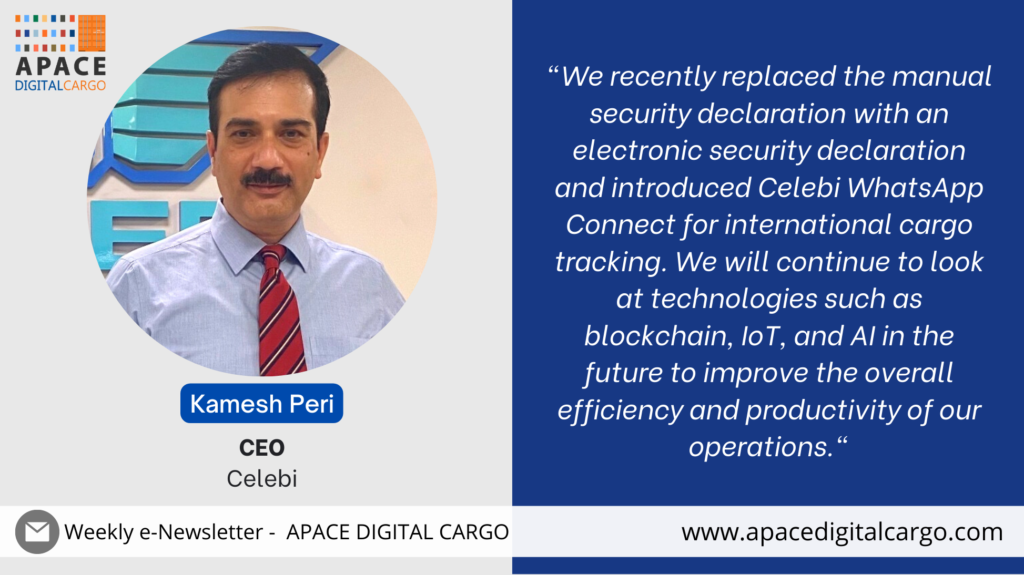
Continuing our #LogisticsTrends2023 series, we have insights from Kamesh Peri, CEO, Celebi, believes that the government has made its intent very clear: to make the Indian logistics industry globally competitive and they have established a platform for industry stakeholders to address their concerns and challenges.Here are the excerpts:
What was the greatest trend in the logistics industry in 2022 according to you?
The logistics industry was hoping to recover from the pandemic effects but continued to face challenges like geo-political tension due to the Russia-Ukraine war, rising energy costs, and inflation. Despite all the challenges, the industry continued to adopt advanced technology and digitalisation, and in fact, digitalisation has picked up pace as the pandemic has taught us the importance of going contactless and paperless. The rising cases of COVID in China and various other countries may continue to challenge the global economic recovery.
According to you, what are the milestones achieved for the industry in 2022?
With the New Logistics Policy 2022, the government has made its intent very clear: to make the Indian logistics industry globally competitive. The government has established a platform for industry stakeholders to address their concerns and challenges. The increased interaction between the industry stakeholders and the policy makers is a significant step towards resolving fundamental issues such as the flow of information between the government authorities and the industry stakeholders.
With the digital transformation in the logistics industry, technology has reshaped the industry by increasing productivity in the supply chain and reducing costs and errors. What is your opinion and how will it take shape in 2023?
With increased digitalisation, automation, and innovation, the supply chain will continue to evolve. The pandemic has accelerated the transition of manual and paper-based processes to digital and automated systems. Riding the wave of digitalisation is inevitable for every small and big player, or one may get swamped by it. At Celebi Delhi Cargo, we have improved the features of the warehouse management system and increased security to ensure data safety and integrity. We recently replaced the manual security declaration with an electronic security declaration and introduced CelebiWhatsApp Connect for international cargo tracking. We will continue to look at technologies such as blockchain, IoT, and AI in the future to improve the overall efficiency and productivity of our operations.
How do you see the government intervention in the sector? What are the expectations?
The government has envisaged making the Indian logistics industry globally competitive and achieving a top 25 ranking by 2030 on the Logistic Performance Index (LPI) curated by the World Bank. Various advisories are set up by the Aviation Ministry to understand the challenges faced by the industry. Industry stakeholders and policymakers are working closely to create a robust and resilient ecosystem. We welcome these positive initiatives taken by the government to provide additional impetus to the modernisation of the logistic ecosystem.
The government plans to establish 33 new domestic cargo terminals by 2024–2025, and the Civil Aviation Ministry is ambitious to grow cargo volumes to 10 million metric tonnes by 2030. We are very much aligned with the government’s vision and are always looking for opportunities to support infrastructure development and capacity building. We will be actively participating in the process of providing ground handling and cargo handling services at the upcoming airports and cargo hubs.
Will sustainability be the trend for the industry?
Sustainable development is the need of the hour. Human activities have been the main driver of climate change, which cannot be reversed overnight. Global policies and the mandatory adoption of sustainable practises will protect our environment from further damage in the coming years. The aviation ministry aims to have 92-93 carbon-neutral airports by 2024 and net zero emissions for all Indian airports by 2030. The focus on sustainable practises has increased our responsibility and efforts to embrace environmentally friendly practises and work towards achieving net zero carbon emissions.
What is the Outlook 2023 for the logistics industry?
The logistics industry has faced some of the toughest challenges in the last three years, and there is a new normal that we have adopted to a greater extent through process optimisation and technological innovations. The Indian logistics industry is set to transform into a modern, technology-driven logistic ecosystem. The increasing use of drones and initiatives to test advanced technologies like Hyper-loop have the potential to take our logistics industry to new heights. We are very optimistic and bullish about the future of Indian aviation and the air cargo industry.




